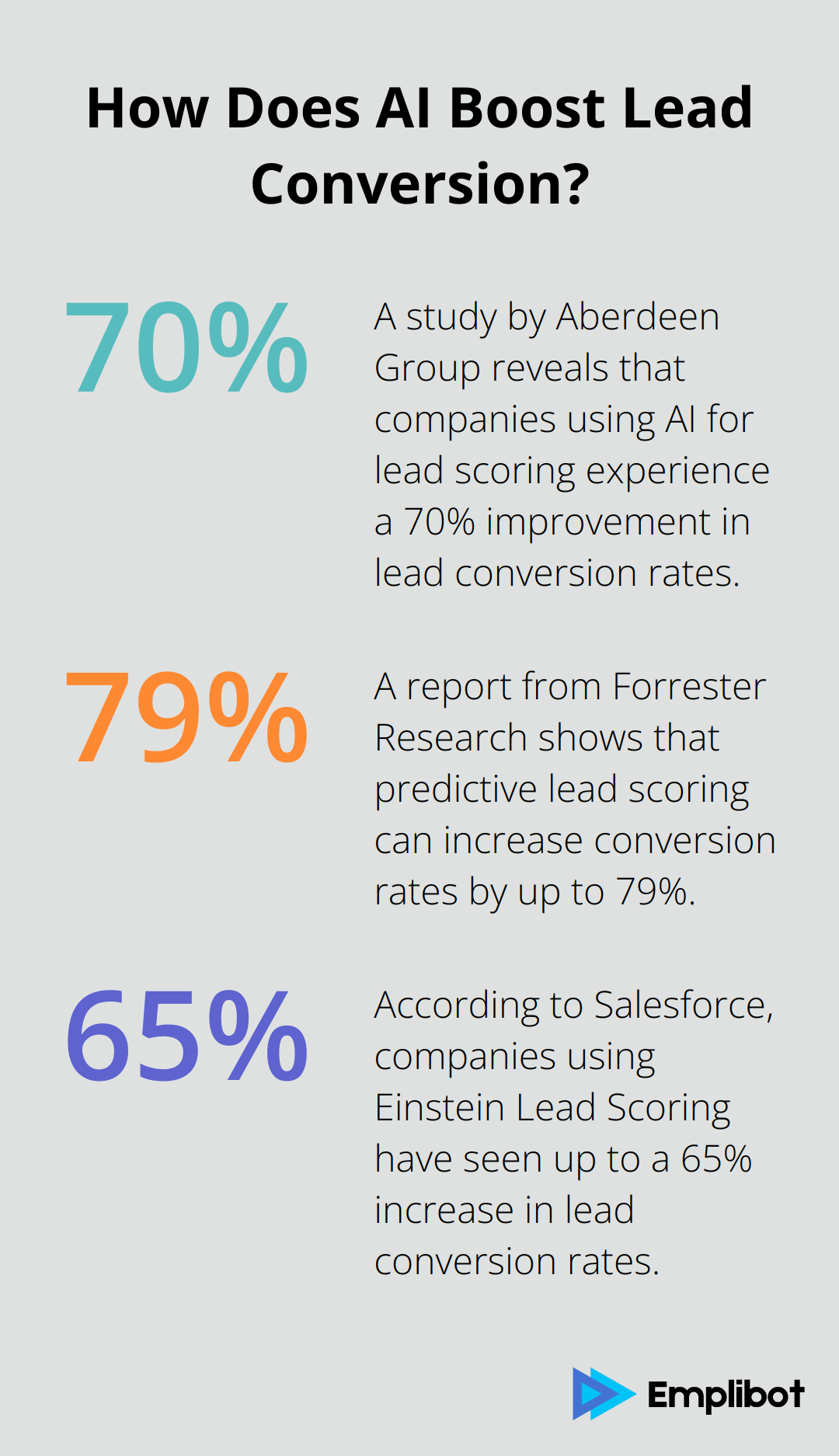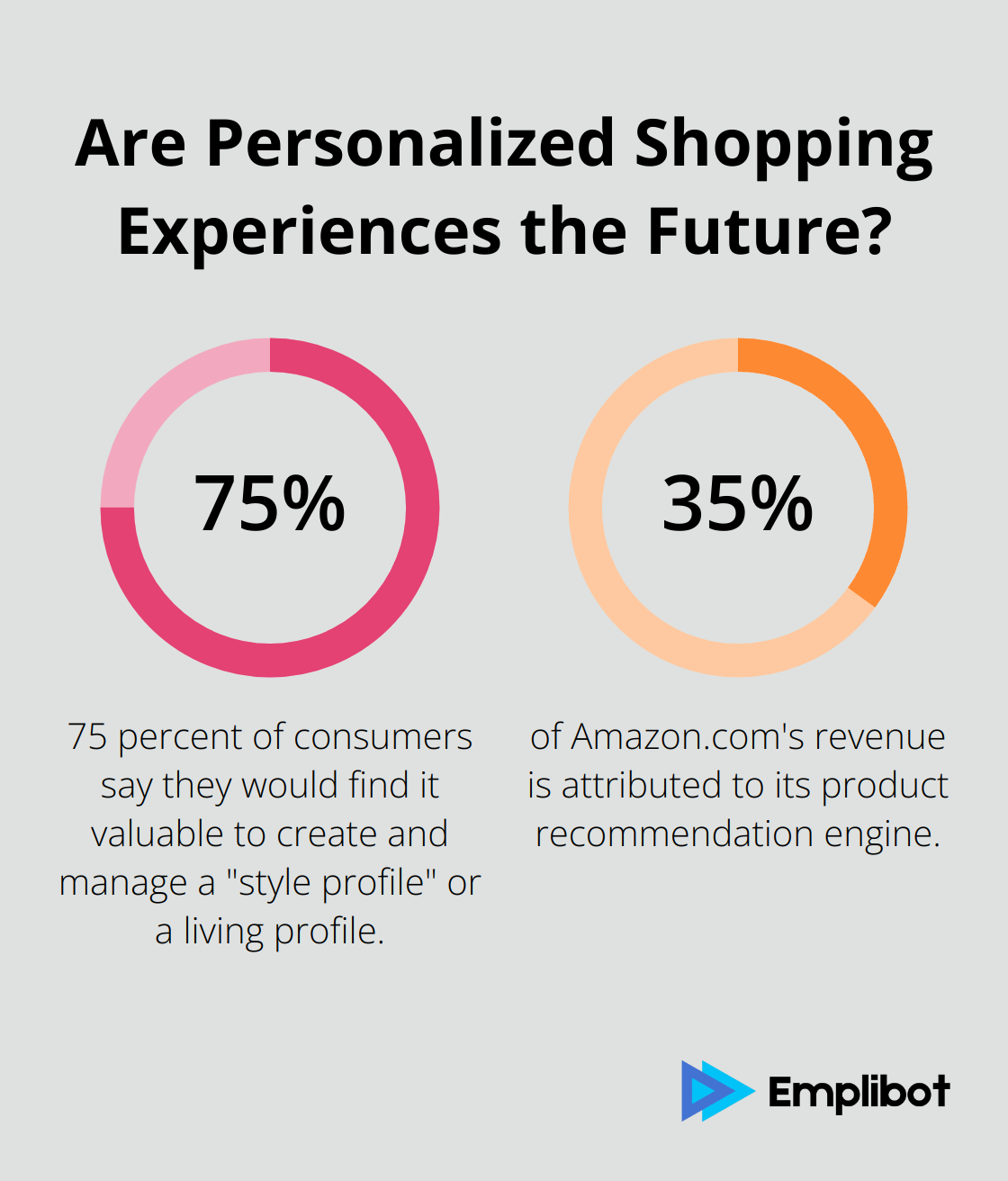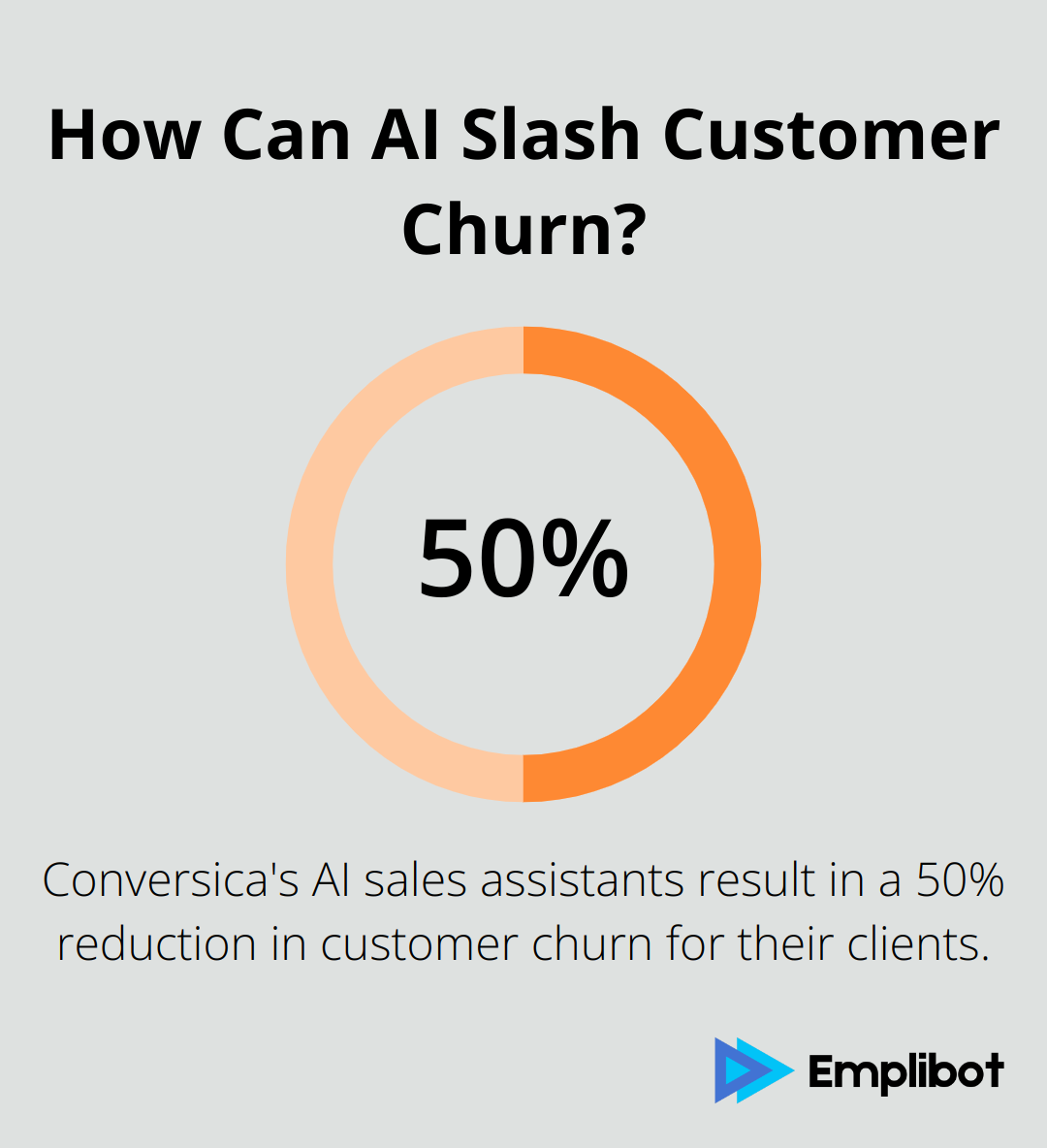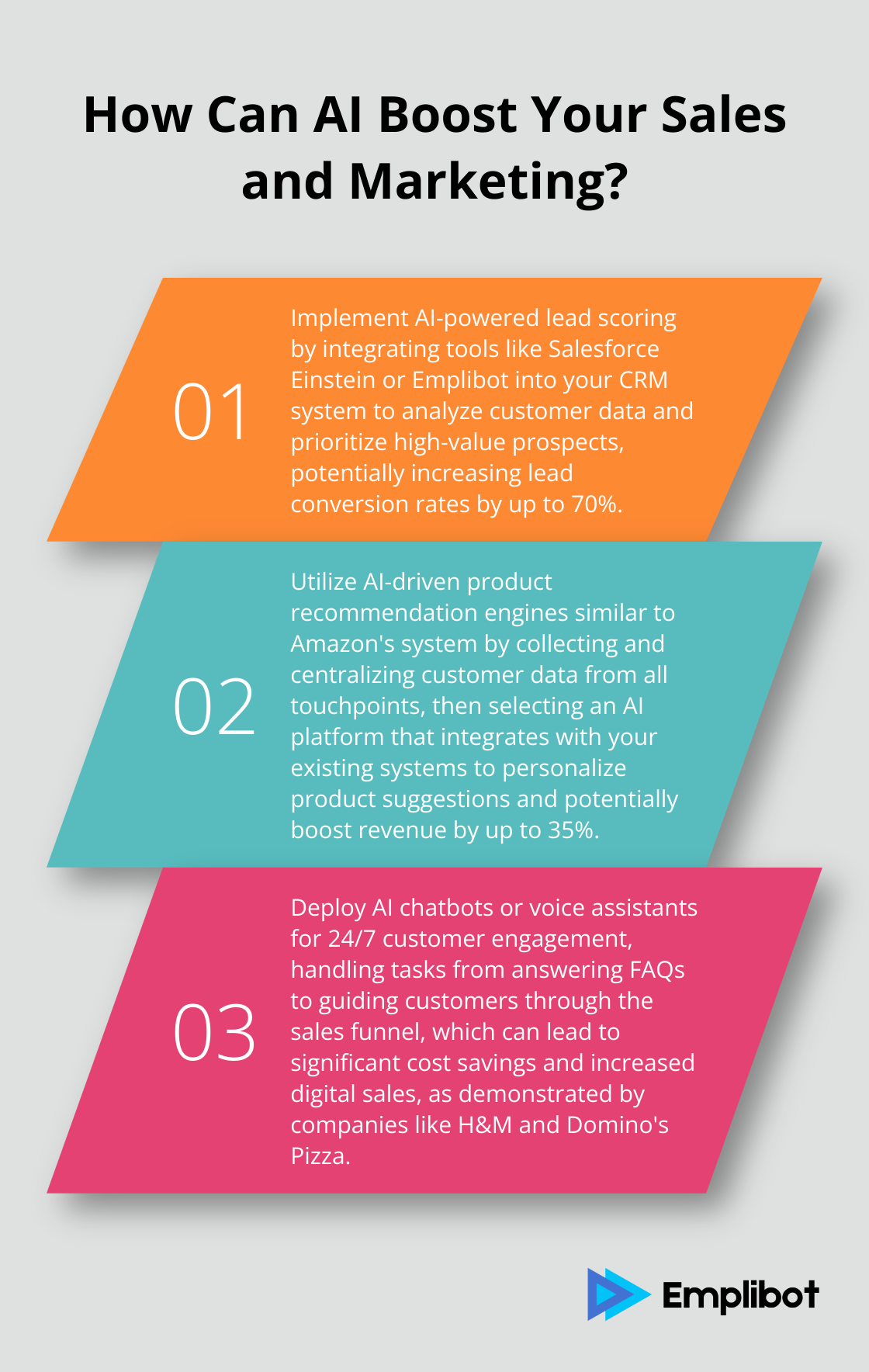AI is revolutionizing the sales landscape, offering game-changing tools and strategies. At Emplibot, we’ve seen firsthand how these technologies are transforming businesses.
In this post, we’ll explore real-world AI in sales examples that are driving results. From lead scoring to personalized recommendations, we’ll show you how AI is boosting sales performance across industries.
How AI Revolutionizes Lead Scoring
The Power of Automated Data Analysis
AI-powered lead scoring transforms how sales teams prioritize prospects and allocate resources. This technology analyzes vast amounts of customer data to predict which leads are most likely to convert, allowing sales professionals to focus their efforts where they matter most.

AI algorithms now process customer interactions, demographic information, and behavioral data at lightning speed. This automated analysis uncovers patterns and insights that human analysts might miss, providing a more accurate picture of lead quality.
A study by Aberdeen Group reveals that companies using AI for lead scoring experience a 70% improvement in lead conversion rates. These numbers highlight the significant impact AI can have on a company’s bottom line.
Predictive Modeling: The Future of Lead Prioritization
AI doesn’t just analyze past data; it uses this information to predict future outcomes. Predictive modeling algorithms consider factors like past purchase history, website interactions, and social media engagement to forecast which leads are most likely to convert.
A report from Forrester Research shows that predictive lead scoring can increase conversion rates by up to 79%. This dramatic improvement demonstrates the power of AI to identify high-value prospects that traditional methods might overlook.
Salesforce Einstein: A Case Study in AI-Driven Lead Scoring
Salesforce Einstein Lead Scoring exemplifies the potential of AI in sales. This tool analyzes historical lead and opportunity data to automatically identify the factors most likely to indicate a qualified lead. It then assigns a score to each new lead based on these factors.
According to Salesforce, companies using Einstein Lead Scoring have seen up to a 65% increase in lead conversion rates. One notable success story is AdRoll (a marketing platform) that implemented Einstein Lead Scoring.
While Salesforce Einstein impresses many, it’s worth noting that Emplibot offers similar AI-powered capabilities for content creation and distribution, which can significantly boost lead generation efforts. By combining AI-driven content strategies with advanced lead scoring, businesses can create a powerful sales funnel that consistently delivers high-quality leads.
The Future of AI in Lead Scoring
As AI continues to evolve, we can expect even more sophisticated lead scoring models that incorporate real-time data and adapt to changing market conditions. These advancements will likely include:
- Enhanced data integration (pulling information from a wider range of sources)
- More accurate predictive analytics
- Real-time scoring adjustments based on market trends
For sales teams looking to stay ahead of the curve, embracing AI-powered lead scoring is no longer optional-it’s a necessity for success in today’s competitive landscape.
Now that we’ve explored how AI revolutionizes lead scoring, let’s turn our attention to another powerful application of AI in sales: personalized recommendations.
How AI Personalizes Sales Recommendations
The Power of AI-Driven Product Suggestions
AI algorithms analyze customer behavior, purchase history, and preferences to recommend products that appeal to individual users. This personalization transcends simple demographic segmentation, considering factors like browsing patterns, past purchases, and seasonal trends.

A study by Accenture reveals that 75 percent of consumers say they would find it valuable to create and manage a “style profile” or a living profile. This statistic underscores the importance of effective personalization in today’s competitive market.
Tailoring Pricing Strategies with AI
AI optimizes pricing strategies in addition to personalizing product recommendations. It analyzes market trends, competitor pricing, and individual customer data to suggest the optimal price point for each customer, maximizing both sales and profit margins.
A report by McKinsey indicates that companies using AI for dynamic pricing can increase their profit margins by up to 10%. This significant boost in profitability demonstrates the effectiveness of AI-driven pricing strategies.
Amazon’s Recommendation Engine: A Gold Standard
Amazon’s recommendation engine often serves as the gold standard in AI-powered personalization. The e-commerce giant attributes 35% of Amazon.com’s revenue to its product recommendation engine. This success story illustrates the massive potential of AI in driving sales through personalized recommendations.
While Amazon’s system impresses many, it’s worth noting that Emplibot offers similar AI-powered capabilities for content creation and distribution. By combining personalized content strategies with product recommendations, businesses can create a holistic approach to customer engagement that drives both traffic and sales.
Implementing AI-Powered Recommendations
Businesses looking to implement AI-powered recommendations should follow these key steps:
- Collect and centralize customer data from all touchpoints
- Select an AI platform that integrates with existing systems
- Launch a pilot program to test and refine AI models
- Monitor and adjust AI algorithms based on performance
The goal extends beyond recommending products; it aims to create a personalized shopping experience that fosters customer loyalty.
As AI technology evolves, we can expect even more sophisticated recommendation systems that incorporate real-time data, contextual information, and emotional factors. For businesses aiming to maintain a competitive edge, embracing AI-powered personalization has become a necessity for success in today’s data-driven marketplace.
Now that we’ve explored how AI personalizes sales recommendations, let’s examine another powerful application: AI-enhanced customer interactions.
How AI Transforms Customer Interactions
AI revolutionizes how businesses engage with customers in today’s fast-paced sales environment. From initial contact to ongoing support, AI-powered tools enhance customer interactions, improve satisfaction, and increase sales.
The Rise of AI Chatbots in Sales
AI chatbots provide instant, 24/7 customer engagement. These virtual assistants handle a wide range of tasks, from answering frequently asked questions to guiding customers through the sales funnel.

Statistics show one of the biggest benefits of using advanced AI chatbots in customer service is the cost saving. Real world examples have demonstrated this effectiveness.
H&M exemplifies effective chatbot use in retail. Their AI chatbot helps customers find products and create outfits. It asks questions about style preferences and occasion, then suggests personalized outfit combinations. This personalization increases engagement and sales for H&M.
Voice Assistants: The Next Frontier in Sales Support
Voice assistants gain traction in sales, offering hands-free support for customers and sales representatives. These AI-powered tools schedule appointments, provide product information, and even process orders.
The number of voice assistant users is expected to surge in 2024, with an estimated 8.4 billion people using them, compared to 4.2 billion in 2020.
Domino’s Pizza demonstrates successful voice assistant integration. Customers place orders through Amazon Alexa or Google Assistant, streamlining the ordering process and improving convenience. This innovation contributes to Domino’s digital sales growth (now over 65% of total sales).
AI Sales Assistants: Boosting Efficiency and Conversion Rates
AI sales assistants take customer interactions to the next level. They automate and optimize various aspects of the sales process. These sophisticated tools engage leads, qualify prospects, and nurture relationships over time.
Conversica, a leading AI sales assistant provider, reports their clients see an average 35% increase in sales opportunities and a 50% reduction in customer churn. These figures highlight AI’s transformative potential in sales.
A major telecommunications company (a Conversica client) implemented their AI assistant to follow up on leads from trade shows and online inquiries. The AI assistant engaged with over 250,000 leads, identifying 35,000 hot leads ready for sales representatives. This efficiency surpasses human capabilities.
While Conversica impresses many, Emplibot offers similar AI-powered capabilities for content creation and distribution. Emplibot combines AI-driven content strategies with automated lead engagement, creating a comprehensive approach to customer interactions that drives both engagement and sales.
The Future of AI in Customer Interactions
AI continues to evolve, promising more sophisticated tools for enhancing customer interactions. Future developments may include:
- Predictive analytics to anticipate customer needs
- Emotion recognition technology to tailor responses
- Advanced personalization based on real-time data
Companies that embrace AI-enhanced customer interactions position themselves for success in today’s competitive market. These powerful tools provide superior customer experiences, increase efficiency, and ultimately drive more sales.
Final Thoughts
AI transforms the sales landscape with powerful tools that enhance every aspect of the process. The AI in sales examples we explored demonstrate tangible benefits businesses achieve by embracing these innovations. As AI evolves, we expect advancements in predictive analytics, real-time personalization, and emotionally intelligent AI assistants.

Companies that leverage AI technologies gain a significant competitive advantage. They improve lead conversion rates, increase customer satisfaction, and drive revenue growth. However, effective AI implementation requires careful planning, ongoing optimization, and a commitment to data-driven decision-making.
For businesses aiming to harness AI in their sales and marketing efforts, Emplibot offers a comprehensive solution. It automates content creation, distribution, and optimization across various platforms (enabling businesses to consistently engage their audience and generate high-quality leads). This AI-driven approach to content marketing complements sales-focused AI tools, creating a powerful synergy that can significantly boost overall business performance.

